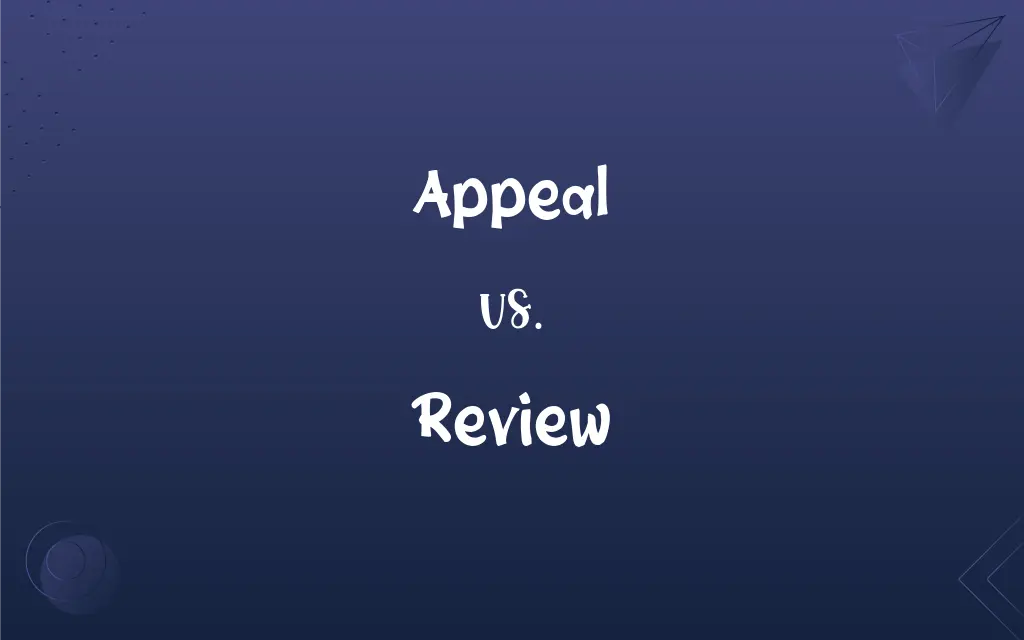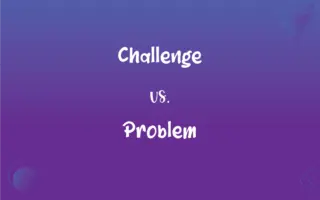Appeal vs. Review: What's the Difference?
Edited by Harlon Moss || By Janet White || Published on December 29, 2023
An appeal is a request for a higher authority to reconsider a decision, while a review is an evaluation or reexamination of something.

Key Differences
An appeal involves formally requesting a higher authority to overturn a decision, often used in legal contexts. A review, however, is an assessment or critique of a product, service, or performance.
Appeals are based on arguments that a decision was unjust or incorrect, emphasizing the need for reconsideration. Reviews are evaluations or summaries that provide feedback or analysis on various subjects.
In the legal system, an appeal is a procedural process to challenge a court's decision, seeking a different outcome. In contrast, a review is often a systematic process of examining information, literature, or performances, aiming for a comprehensive understanding.
The purpose of an appeal is to achieve a change or reversal of a previous decision. Reviews aim to inform, critique, or summarize a subject for better understanding or decision-making.
Appeals are typically formal and follow specific rules and protocols, especially in a legal context. Reviews can be formal or informal, varying greatly in style, such as academic reviews, product reviews, or performance critiques.
ADVERTISEMENT
Comparison Chart
Part of Speech
Noun, Verb
Noun, Verb
Number of Syllables
2 (ap-peal)
2 (re-view)
Usage in a Sentence
"They filed an appeal against the court's verdict."
"She wrote a detailed review of the new book."
Common Associated Words
Court, reconsider, decision
Evaluate, critique, assess
Derived Forms
Appealing (adjective), Appealingly (adverb)
Reviewer (noun), Reviewable (adjective)
ADVERTISEMENT
Appeal and Review Definitions
Appeal
Appeal can mean the power of being attractive or interesting.
The book's appeal lies in its detailed character development.
Review
Review also refers to writing a critical appraisal of a book, play, or other work.
She wrote a glowing review of the new novel.
Appeal
Appeal is also a legal process by which a case is brought before a higher court.
Their lawyer suggested an appeal to the Supreme Court.
Review
Review is an examination or assessment of something.
He conducted a thorough review of the financial reports.
Appeal
In a broader sense, appeal is a serious or urgent request to the public.
The charity made an appeal for donations.
Review
In an academic or professional context, review involves evaluating or summarizing a subject or field.
The scientist published a review of recent research in her field.
Appeal
In advertising and marketing, appeal refers to the quality of being attractive to certain consumers.
The product's unique appeal helped it stand out in the market.
Review
Review can be a retrospective view or survey.
The meeting began with a review of last year's achievements.
Appeal
Appeal refers to a request for a decision to be reconsidered by a higher authority.
The defendant filed an appeal to overturn the guilty verdict.
Review
In a military context, review refers to a formal inspection of troops.
The general conducted a review of the troops before deployment.
Appeal
An earnest or urgent request, entreaty, or supplication.
Review
To look over, study, or examine again
Reviewed last week's lesson.
Review
To consider retrospectively; look back on
Reviewed the day's events.
FAQs
What does a review aim to achieve?
To provide an assessment, critique, or summary of a particular subject or item.
What is the main purpose of an appeal?
To request a higher authority to reconsider and potentially overturn a previous decision.
Who can conduct a review?
Reviews can be conducted by anyone, from professionals to consumers, depending on the context.
Is an appeal always heard by a higher court?
In legal contexts, yes, appeals are typically heard by a higher court.
What are grounds for an appeal?
Grounds include legal errors, procedural mistakes, or new evidence.
Can reviews influence public opinion?
Yes, reviews can significantly shape public perceptions and decisions.
Are appeals limited to legal cases?
While commonly used in law, appeals can also be made in other settings, like administrative decisions.
What types of reviews are there?
There are many types, including product reviews, literature reviews, and performance reviews.
Can anyone file an appeal?
Generally, only parties involved in a decision or their legal representatives can file an appeal.
How do reviews impact businesses?
Reviews can significantly affect a business's reputation and customer decisions.
Are all reviews published?
Not all reviews are published; some are internal or for personal use.
Can appeals overturn decisions?
Yes, appeals can result in the reversal or modification of the original decision.
Can an appeal be denied?
Yes, appeals can be denied if deemed without merit or not meeting specific criteria.
Do reviews require expertise?
Some reviews, like academic ones, require expertise, but many do not.
What should a review contain?
A review should offer a balanced evaluation or summary of the subject matter.
What's the difference between an appeal and a complaint?
An appeal seeks to change a decision, while a complaint expresses dissatisfaction without necessarily seeking a change.
How long does an appeal process take?
The duration varies widely, depending on the complexity and legal jurisdiction.
Are reviews subjective?
While aiming for objectivity, reviews often contain subjective opinions and analyses.
What happens after an appeal is successful?
The outcome depends on the case; it might lead to a new trial, a different verdict, or a change in sentencing.
Is a review always negative?
No, reviews can be positive, negative, or neutral, depending on the evaluator's findings.
About Author
Written by
Janet WhiteJanet White has been an esteemed writer and blogger for Difference Wiki. Holding a Master's degree in Science and Medical Journalism from the prestigious Boston University, she has consistently demonstrated her expertise and passion for her field. When she's not immersed in her work, Janet relishes her time exercising, delving into a good book, and cherishing moments with friends and family.
Edited by
Harlon MossHarlon is a seasoned quality moderator and accomplished content writer for Difference Wiki. An alumnus of the prestigious University of California, he earned his degree in Computer Science. Leveraging his academic background, Harlon brings a meticulous and informed perspective to his work, ensuring content accuracy and excellence.






































































